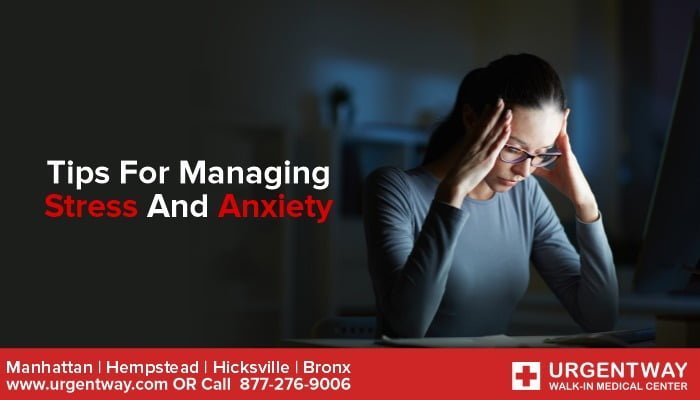Stress and anxiety are the natural reactions of our body when we experience any fear or danger. The purpose of this response is to ensure a person is alert, focused, and ready to deal with a threat. Stress hormones increase the heartbeat resulting in high blood pressure. Fast heartbeat, shivering, fast breathing, nausea, and dizziness are the common symptoms of stress and anxiety. There is no proper treatment of stress and anxiety. Instead, there are many tips to manage these emotions. In this blog, you’ll go through stress and anxiety, their causes, common symptoms, and some tips to manage stress and anxiety.
1. What are stress and anxiety?
Almost all people experience stress and anxiety from time to time. Both are emotional responses, but the stress is triggered by some external triggers that can be short-term or long-term, such as workload, while the anxiety is persistent even in the absence of a stressor.
2. What are the symptoms of stress and anxiety?
Common symptoms are as below:
- Feeling nervous, restless, or tense
- Having a sense of impending danger, panic, or doom
- Having an increased heart rate
- Breathing rapidly (hyperventilation)
- Sweating
- Trembling
- Feeling weak or tired
- Trouble concentrating or thinking about anything other than the present worry
- Having trouble sleeping
- Experiencing gastrointestinal (GI) problems
- Muscle tension and headache
- Having difficulty controlling worry
- Having the urge to avoid things that trigger anxiety
- Shaking, and fatigue
- Frequent urination
- Change in appetite
3. What are the causes of stress and anxiety?
Stress and anxiety are emotional responses for a short period, so they come and go away. The following are the common causes:
- Moving
- Starting a new school or job
- Having an illness or injury
- Having a friend or family member who is ill or injured
- Death of a family member or friend
- Getting married
- Having a baby
- Underlying health condition
- Medication side-effects
- Suffering from chronic disease
4. Tips for managing stress and anxiety
There are some practical tips to manage stress and anxiety, such as given below:
i. Keep hydrated
Drinking plenty of water or juices can minimize the discomfort of being too anxious because water has natural calming properties.
ii. Use of blue light
Blue light reduces anxiety and mood disorders by influencing the biological clock and accelerating the relaxation process.
iii. Color therapy
Color therapy is also the best way to improve mood swings, reduce stress and anxiety, and feel relaxed because colors are directly associated with our body’s hormones.
iv. Lavender aromatherapy
Lavender aromatherapy reduces stress and anxiety by directly influencing the limbic system of your brain, which is responsible for controlling emotions like anxiety.
v. Wearing weighted blanket
Taking a weighted blanket can reduce stress and anxiety because the pressure of a weighted blanket puts your autonomic nervous system into rest mode and triggers the release of neurotransmitters responsible for our quality sleep and pleasant mood.
vi. Use of scented candles
Burning a scented candle may feel relaxed because scented candles contain essential oils enriched with “bergamot” and reduce negative emotions, fatigue, salivary cortisol levels, stress, and anxiety.
vii. Use of pillow spray
Pillow spray contains lavender, chamomile, valerian, and bergamot, which improve sleep quality, reduce stress hormones, and stress, anxiety, and relaxation due to having calm properties.
viii. Taking a cold shower
Another more effective way is to take a cold shower that releases the endorphins hormones in your bloodstream responsible for your pleasant mode and get rid of it.
ix. Listening music
Calming music can help settle your mind because the music stops the release of stressing hormones in your blood, reducing stress and anxiety.
x. Regular exercise
Exercise is one of the most important things you can do to combat stress, anxiety, and depression. Putting physical pressure on your body through exercise can relieve mental stress resulting in a calm of your body.
5. Conclusion
All people suffer from stress and anxiety in any part of their life. These intense emotions take control of our body and release stress hormones, resulting in a faster heartbeat, irregular breathing, restlessness, trembling, headache, fatigue, and change in appetite. There are many causes of stress, such as someone’s death or accident, unemployment, medication side effects, or any underlying health condition, etc. There is no medication to treat these emotions, but we can quickly get rid of them by following some simple tips.


